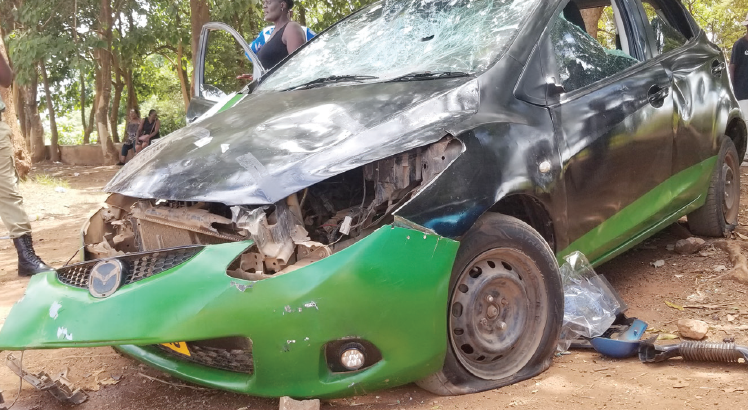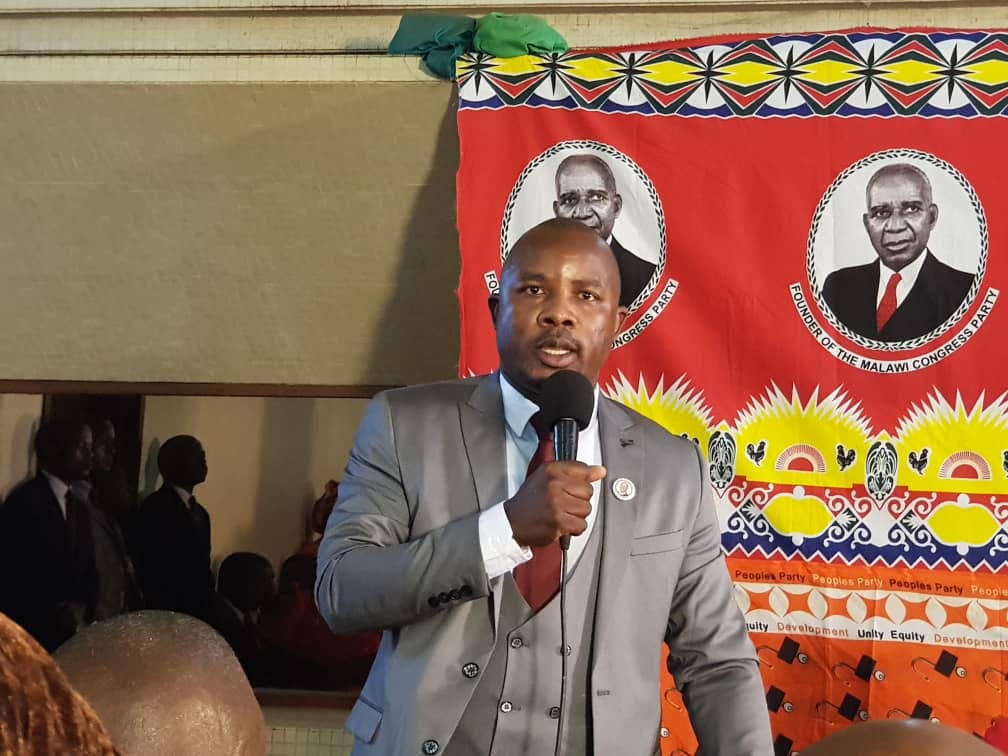Police blame ‘weak’ leadership
The Malawi Police Service (MPS) has, for the first time, blamed political leaders for fanning political violence.
National Police spokesperson Peter Kalaya on Wednesday said violence during electioneering can end if political leaders control the youth.

He said: “We urge political parties to tame their supporters and this is more important than anything else in ensuring a violence-free election period. It is not right to be pointing fingers at the police who go a great distance to ensure safety and security of all when we can end this by just having political leaders who are responsible enough in managing their youths.”
His stand follows last weekend’s attack on Democratic Progressive Party (DPP) followers as they assembled at Mbowe Service in Lilongwe to parade.
During the fracas, about 30 DPP supporters were seriously injured and at least seven private cars were damaged.
The attack started when youths dressed in DPP attire descended on the service station where the DPP supporters had gathered. As we went to press yesterday, police were yet to arrest any suspect in connection with the incident.

DPP spokesperson Shadric Namalomba, while calling on the police to investigate the matter professionally, accused the Malawi Congress Party (MCP) of being behind the incident.
But in a statement a day after the incident, MCP national publicity secretary Ezekiel Ching’oma dismissed the accusations and urged the police to thoroughly investigate the matter.
While condemning the Mbowe violence in a statement on February 25 2024, the Synod of Blantyre’s Church and Society Programme wondered why there were no police officers to provide security to the demonstrators.
According to the synod’s governance arm, the presence of police at the scene would have enabled them to effect immediate arrests of law-breakers.
While also condemning the attack on DPP cadres, a commentator purportedly addressing a Muslim group says in a viral clip that DPP should not seek sympathy now or cry loudest because when they were in power, they were doing the same things to the opposition.
Namalomba did not respond to the observation despite promising to do so.
Kalaya, however, said the service does not practice selective justice because at all times, officers arrest suspected individuals of various crimes.
He said the problem with policing during elections is that “generally, people look at the law-enforcers through their politically tainted eyes and you cannot expect such people to rate us well”.
“However, Malawians should understand that policing in a politically-polarised society is not easy. Even if we do our job right, some sections of society will not be happy with us because they will be looking at us from their politically skewed ground.”
He explained: “Public opinion is constructed by what people say and share in their groups and it is not always right. Facts on the ground as captured in records are the best source and are where we should be basing our sober discussions.”
Social and political analyst Victor Chipofya Junior observed that police officers find themselves caught between a rock and a hard place because of political interference.
He said the police leadership has no strength to bite the finger that feeds it, hence, they are forced to side with ruling parties and serving their interests instead of the citizenry.
“That is injustice,” Chipofya Jnr said.
“We need a law that ensures independence of the police from the Inspector General to the junior-ranked officer. The law will detach them from political interference. They will start thinking differently and remain professional.
“I would like to call upon the Malawi Law Commission to review appointment procedures for the Inspector General and other top police officers. The process needs to be apolitical and that is the only way of dealing with the issue.”
On his part, peace and security expert Alex Chisiano recommended that all electoral stakeholders should sign a pact as a commitment to desist from political violence “because it is evident [that] the forthcoming general elections will be full of emotions, anger and lack of respect for diverse opinions”.
Chisiano also echoed the need for the police to be independent of political interference and to show impartiality.
“They must learn from past mistakes and experiences. Ministries of Homeland Security and Local Government and National Unity have a duty to civic educate the citizenry on tenets of tolerance and democracy.
“The coming general elections will be full of emotions, anger and divisiveness. There will be underhand tactics to outwit each other,” he said.
But Ching’oma said in an interview on Wednesday that his party has never used terror as a political strategy and strongly condemns any form of violence or intimidation.
“We believe in peaceful means of communication and aim to create a safe and inclusive environment for all to participate in [the] political discourse.”
The spokesperson observed that ending political violence is not a one-man show as it requires a multi-faceted approach that involves government machinery, political parties, civil society organisations and the general public.
Meanwhile, the Malawi Human Rights Commission (MHRC) says it has been appraised of last Saturday’s fracas and plans to conduct a full investigation.
MHRC executive secretary Habiba Osman said in an interview the commission will use the findings to engage all party leaders and institutions responsible for ensuring a peaceful election.
“In addition, we intend to engage all political leaders on this issue of violence and rights. We wish to remind all that tolerance is the bedrock of any democratic country. This fundamental principle is embedded in our Constitution. We also expect the police to bring all perpetrators to face justice no matter the party affiliation,” Osman said.
She further said MHRC is looking forward to the recently established Malawi Peace and Unity Commission to act on the matter.
“It will be unfortunate if they do not intervene as this is also an issue that is directly within their mandate as we go towards the campaign period,” Osman said.
The executive secretary also called upon the Malawi Electoral Commission, National Initiative for Civic Education and MHRC to work together with the police and the Peace and Unity Commission to ensure citizens are sensitized and safeguards are entrenched to monitor the red flags and promote dialogue instead of violence or confrontation.
MEC spokesperson Sangwani Mwafulirwa said in an interview yesterday that the official campaign will start on July 15 2025 and that all other activities happening should be taken in the context of people exercising their right to political activities, assembly and other associated rights.





